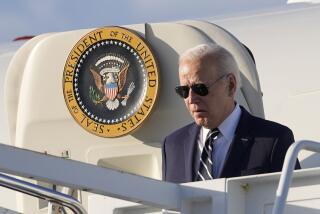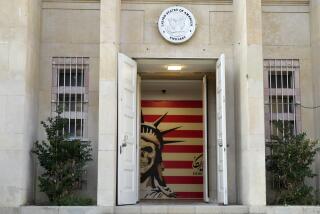U.S. won’t issue visa for Iran’s pick for U.N. ambassador
WASHINGTON — The White House will block Iran’s choice of United Nations ambassador from entering the United States, officials said Friday, stoking new tension between Tehran and Washington as they approach a critical moment in negotiations over Iran’s disputed nuclear program.
Facing overwhelming bipartisan pressure from Congress, White House officials said Hamid Aboutalebi would not be granted a U.S. visa. The choice of the veteran diplomat set off an outcry in Washington because of his membership in the radical student group that stormed the U.S. Embassy in Tehran and held U.S. diplomats hostage during Iran’s 1979 revolution.
White House Press Secretary Jay Carney said U.S. officials had informed Tehran and the U.N. that “our position is that we will not be issuing him a visa.”
Administration officials and Iran experts said they didn’t expect the clash to disrupt the nuclear talks, which are to resume May 13 in Vienna. Iran and the six world powers it’s negotiating with have said they aim to reach a deal by late July to curb Tehran’s nuclear program in exchange for the easing of Western sanctions.
But the latest dispute, which drew an immediate protest from Iran, was a reminder of the friction that is always ready to derail U.S.-Iranian dealings because of the nations’ bitter history.
“It is a regrettable decision by the U.S. administration, which is in contravention of international law, the obligation of the host country and the inherent right of sovereign member states to designate their representatives to the United Nations,” the Iranian mission to the U.N. said in a statement.
The U.S. move, a rare instance of Washington barring a foreign diplomat from serving at a U.N. mission, is likely to draw further criticism that the United States is breaking its commitments as host country.
Under the 1947 agreement setting up the United Nations in New York, the United States “shall not impose any impediments on transit” of officials to U.N. headquarters. But U.S. officials say Congress passed a joint resolution that year, one never accepted by the U.N., authorizing Washington to bar diplomats for security reasons.
Aboutalebi, 57, is among Iran’s most respected diplomats, and he belongs to the reformist camp in Iranian politics. He has served as ambassador to Australia, Belgium and Italy and is viewed as closely aligned with President Hassan Rouhani’s campaign to improve ties with the West.
Aboutalebi has said he wasn’t involved in planning or carrying out the U.S. Embassy attack in 1979 and played only a limited role as an interpreter after the takeover.
But his ties to the searing memory of the hostage incident were enough for the House and Senate to unanimously approve legislation this week demanding that he be barred from New York.
Carney said the White House agreed with the intent of the bill but that officials were studying whether it was constitutional. He declined to say if Obama would sign it. However, even if lawyers find the legislation defective, no visa will be issued.
Officials declined to say if they were rejecting the visa request or simply not acting on it. They said they were barred under confidentiality rules from providing information on visa applications.
Even before the White House decision was announced, Aboutalebi had complained on Twitter that the United States had taken a new approach under which “a national parliament can breach a country’s international commitments through legislation.”
Mohammad Javad Zarif, Iran’s foreign minister, condemned Congress’ move as unacceptable. It was also denounced at Friday prayers at some major mosques in Tehran.
But Iran gave no sign that the flap would wreck the nuclear negotiations. The country maintains that its nuclear program is strictly for peaceful purposes, but Western governments fear Iran wants the capability to build a nuclear bomb.
Ever since the long-stalled talks resumed in February, Washington and Tehran have made it clear that disputes on other issues, including U.S. concern about Iran’s human rights record, its ballistic missile sales and its support for anti-Israel groups Hamas and Hezbollah, won’t derail the nuclear deal-making, which both sides consider a top national interest.
Carney said the talks between Iran and the six world powers — the U.S., Britain, France, Russia, China and Germany — were “moving forward in a workman-like manner that we do not expect to be affected by this decision.”
Analysts said the fact that the two sides met for two days in Vienna this week, while the Aboutalebi clash was brewing, showed they had insulated the nuclear talks from other potential conflicts.
“They’re at the table because they think it’s in their national interest, not because they like us,” said Cliff Kupchan of the Eurasia Group risk-consulting firm.
From the White House perspective, the outcome isn’t all bad. The administration showed “that it can still be tough on Iran, even with the talks going,” said Suzanne Maloney, an Iran specialist at the Brookings Institution’s Saban Center for Middle East Policy.
The visa decision drew praise from some lawmakers who are generally critical of the administration’s approach on Iran.
“The White House made the right call,” tweeted Sen. Mark Steven Kirk (R-Ill.), who has sought to impose even stiffer sanctions on Iran.
More important, perhaps, is that the episode shows that although both sides are striving for a nuclear deal, the much-discussed warming of relations between the longtime adversaries is actually low on both governments’ list of priorities.
Ayatollah Ali Khamenei, Iran’s supreme leader, in recent weeks has thundered criticism of the United States as a treacherous partner. And many U.S. officials say privately that they consider a true alliance a distant goal at best.
Many Iranians are souring on the nuclear negotiations, seeing little economic benefit from the limited easing of sanctions so far. The frustration was evident at a boisterous rally that followed weekly prayers in Tehran on Friday.
Echoing Khamenei’s comments, the protesters vowed that Iran would not dismantle its nuclear program or relinquish enrichment capabilities. “Full nuclear cycle is our inalienable right!” they chanted.
“I think our officials are wasting their time — there is no light at the end of the tunnel for us,” said Somaye Danesh, a homemaker, as she held the hand of her 4-year-old daughter after the rally.
Iranian lawmakers and others were outraged last week when the European Parliament passed a resolution expressing concern about the human rights situation in Iran and questioning Tehran’s election procedures.
“Their secret agenda is not finalizing a nuclear deal with Iran.... They want to promote sodomy and homosexuality in Iran,” said Ali Haghighat, 65, a former public relations manager in the mine industry. “But it is good to keep the enemies of Iran busy by talking to them. That keeps them away from malicious actions against us.”
Times staff writer Richter reported from Washington and special correspondent Mostaghim from Tehran. Times staff writers Christi Parsons in Washington and Patrick J. McDonnell in Beirut contributed to this report.
More to Read
Start your day right
Sign up for Essential California for news, features and recommendations from the L.A. Times and beyond in your inbox six days a week.
You may occasionally receive promotional content from the Los Angeles Times.







